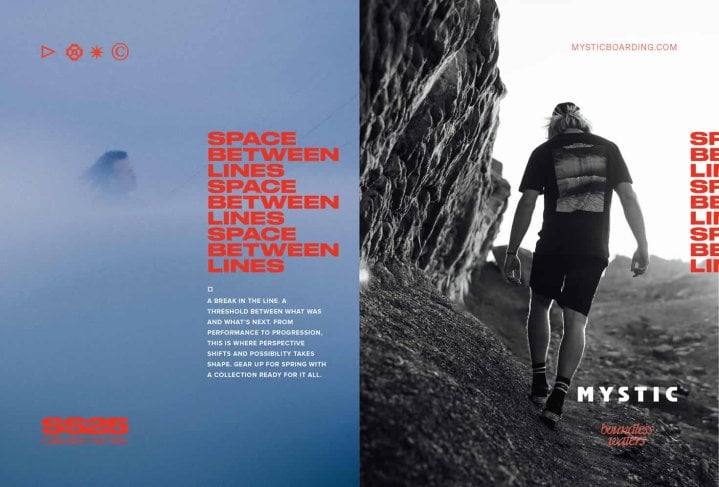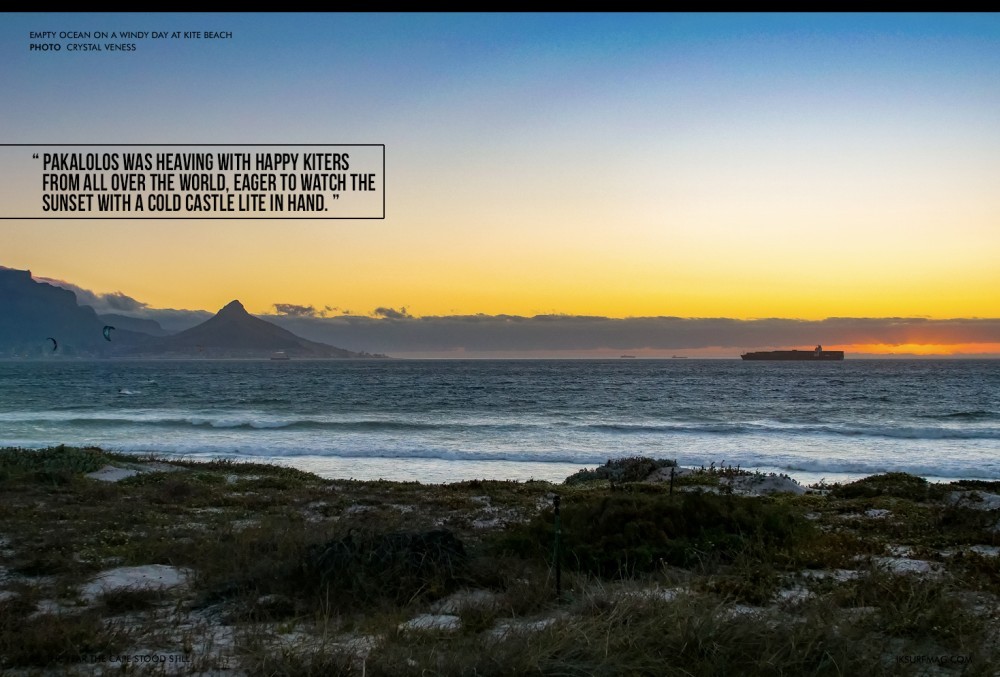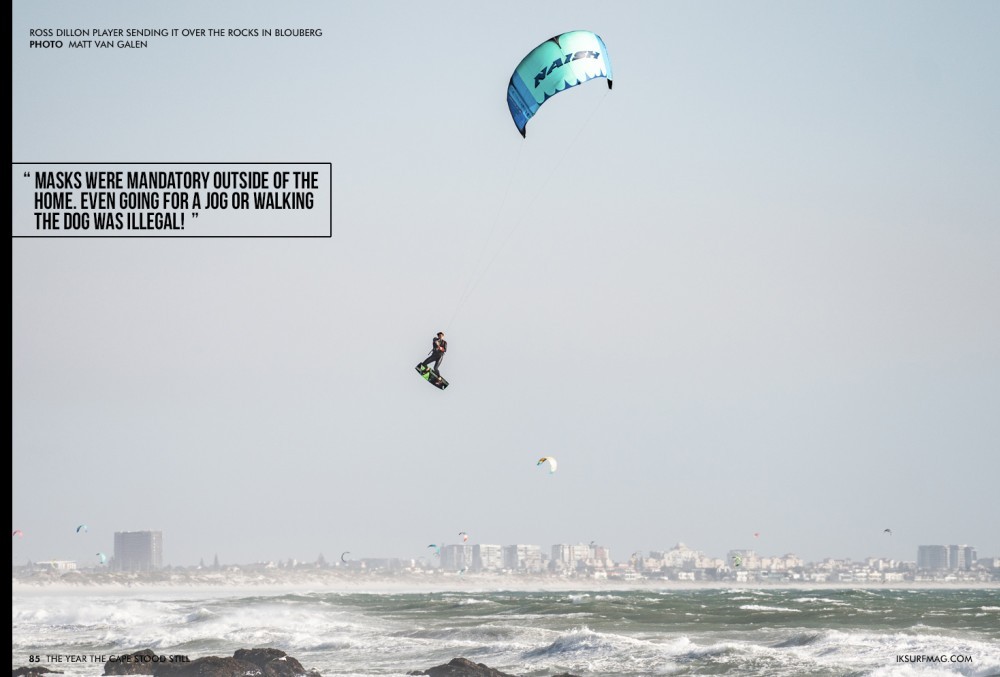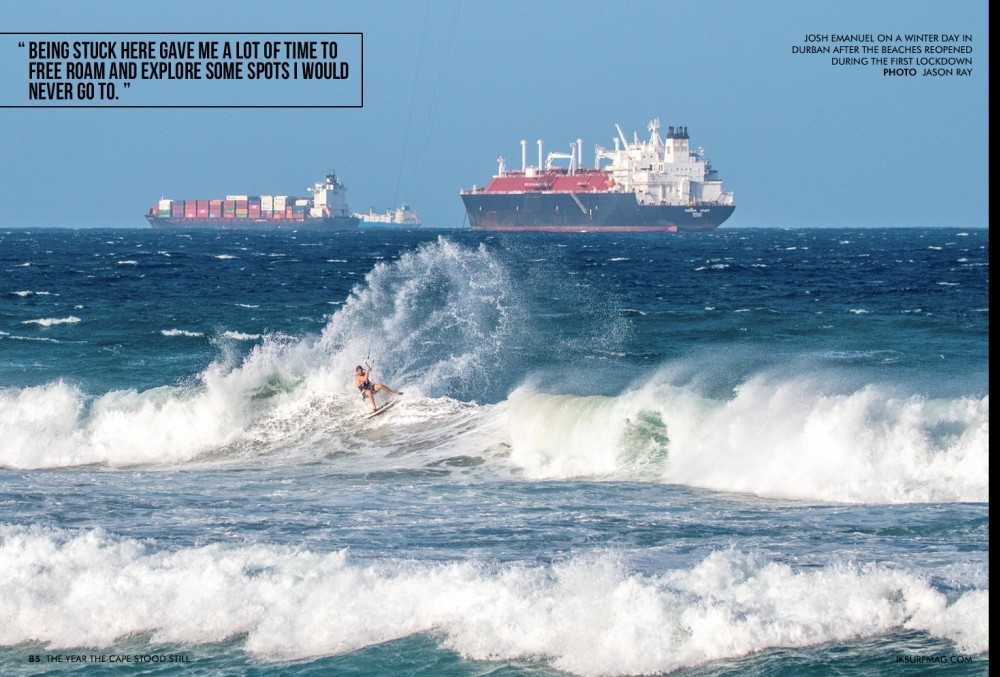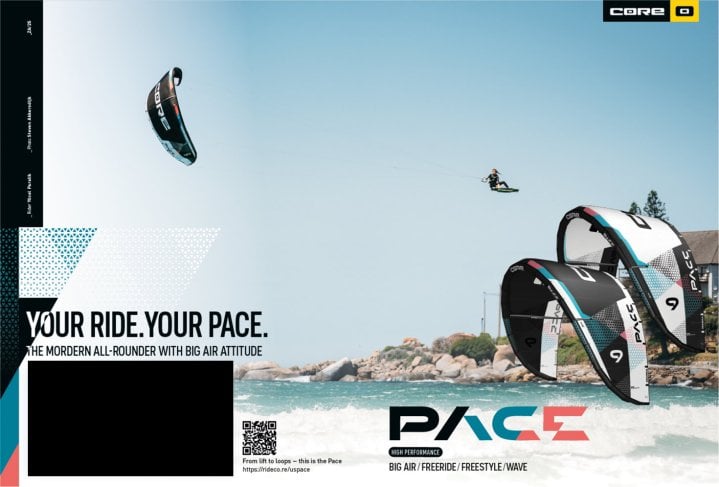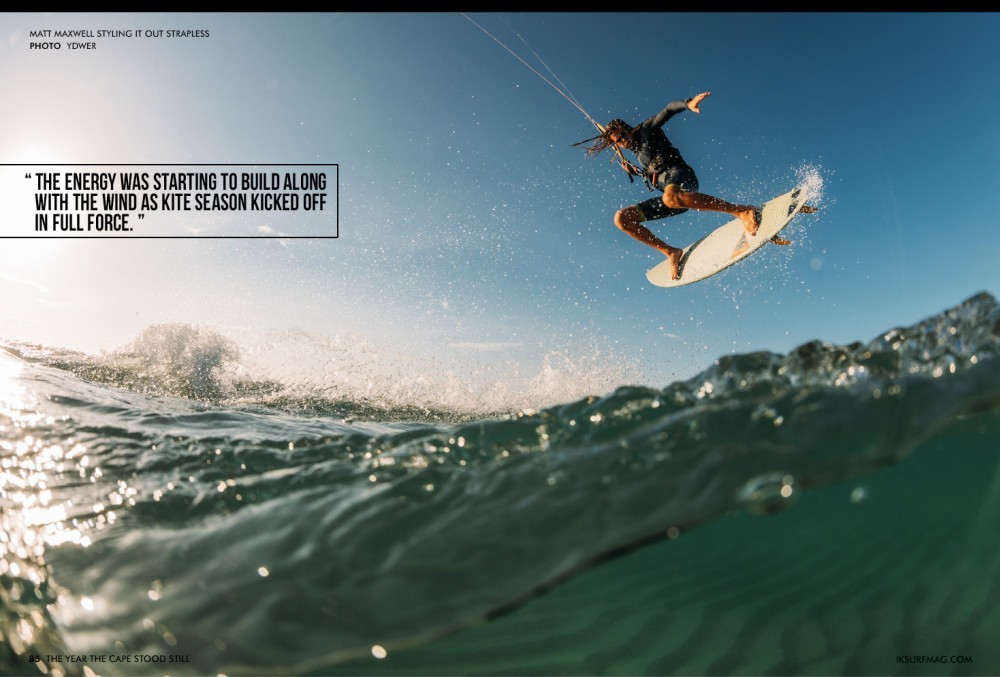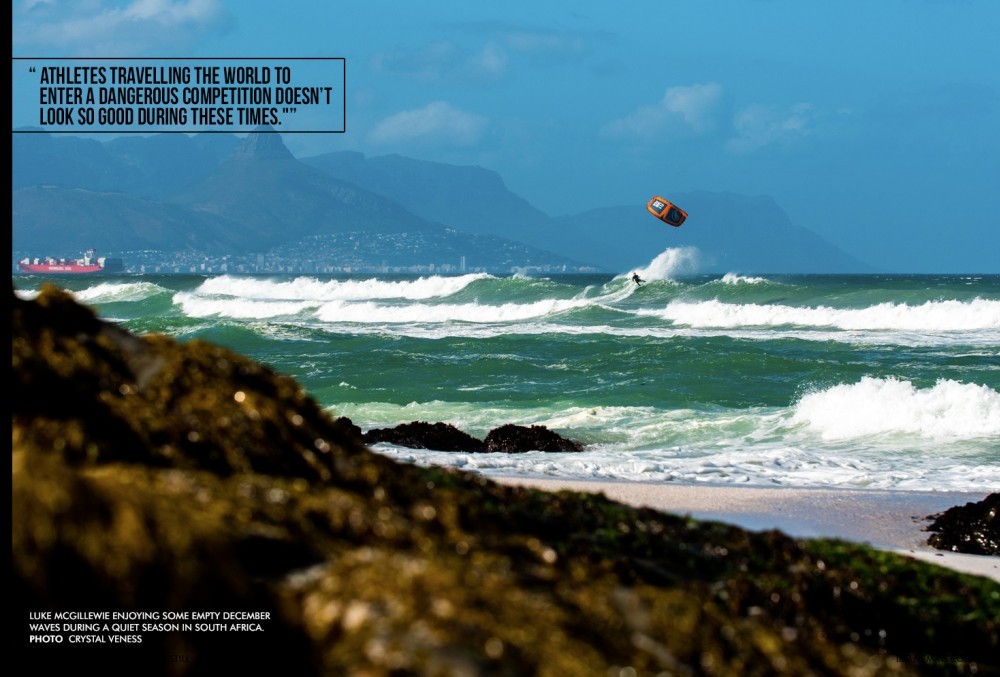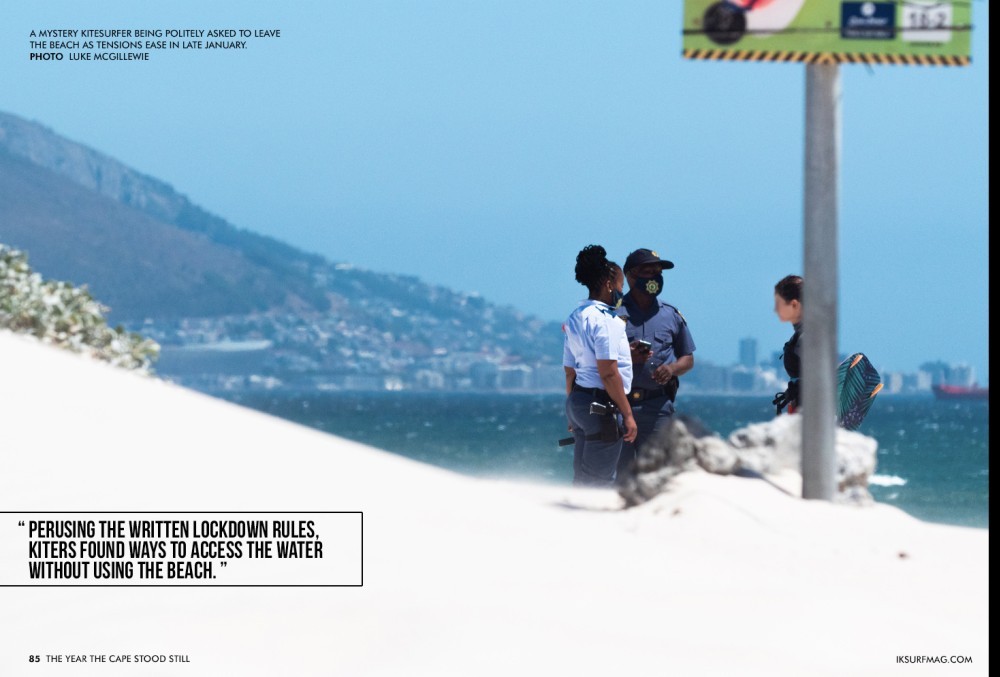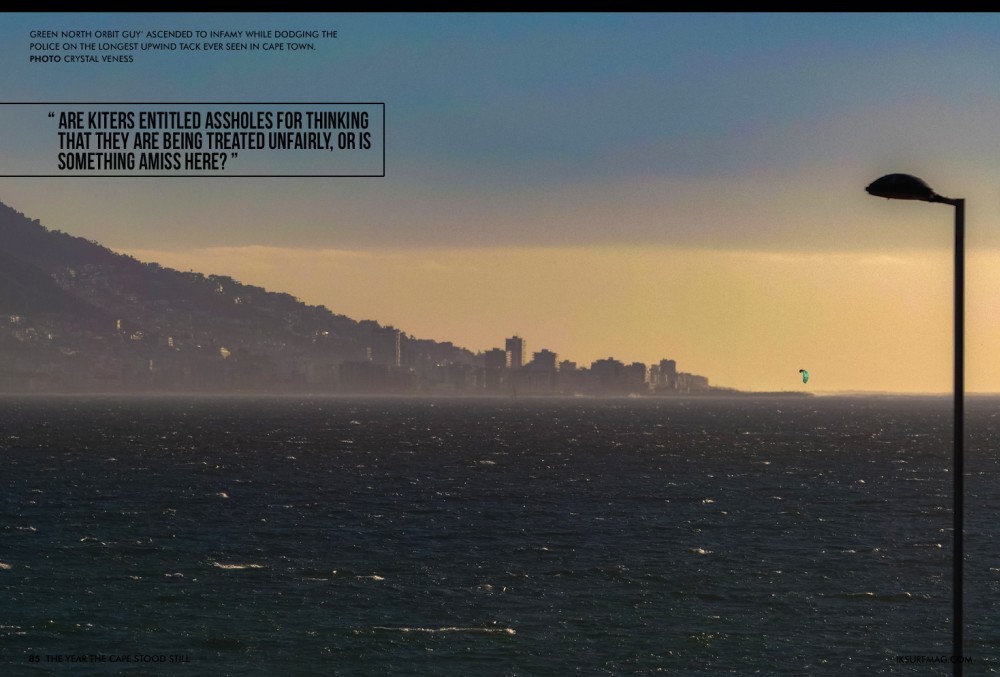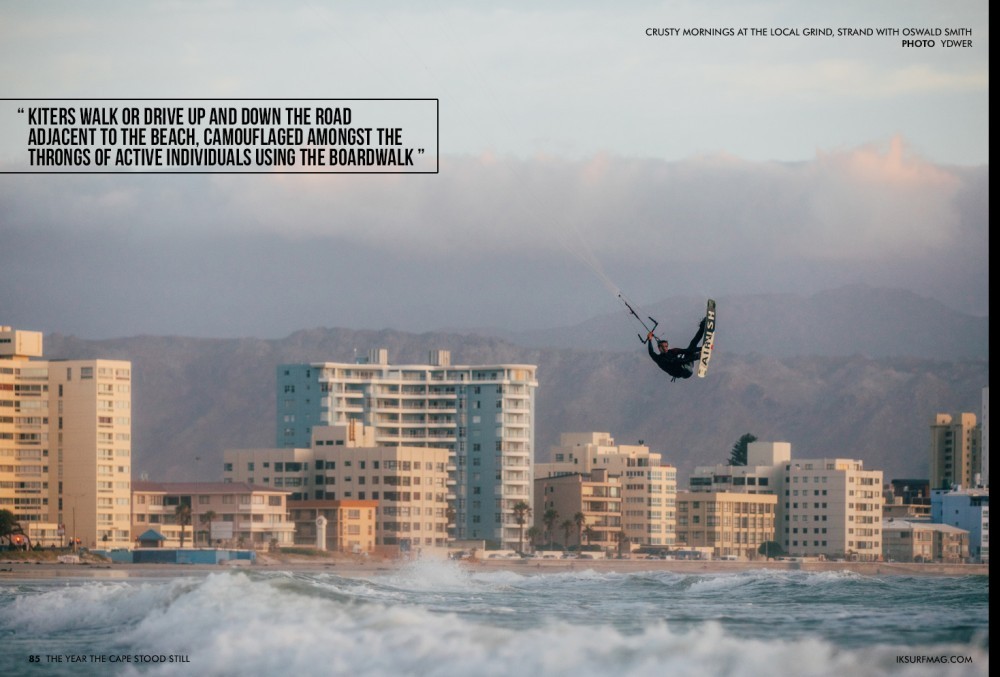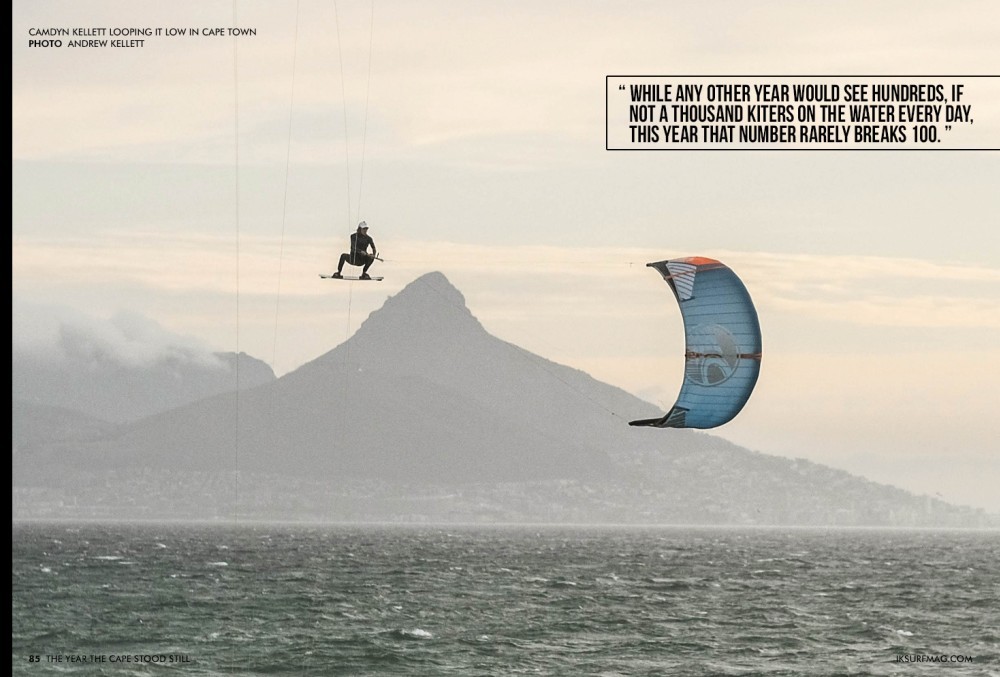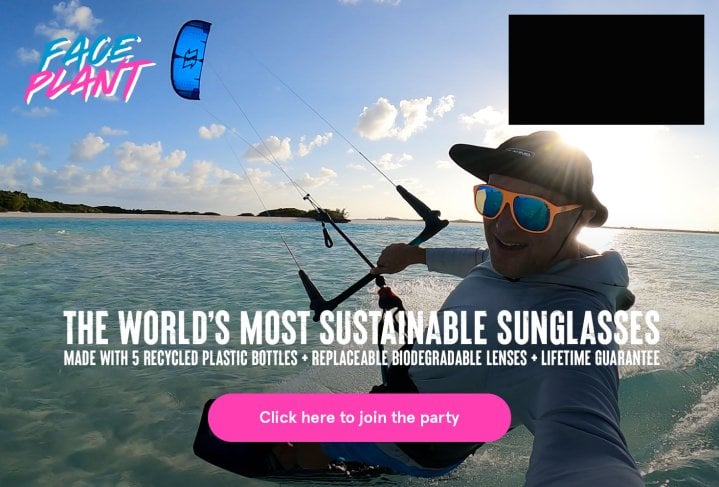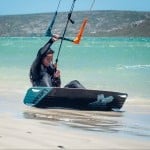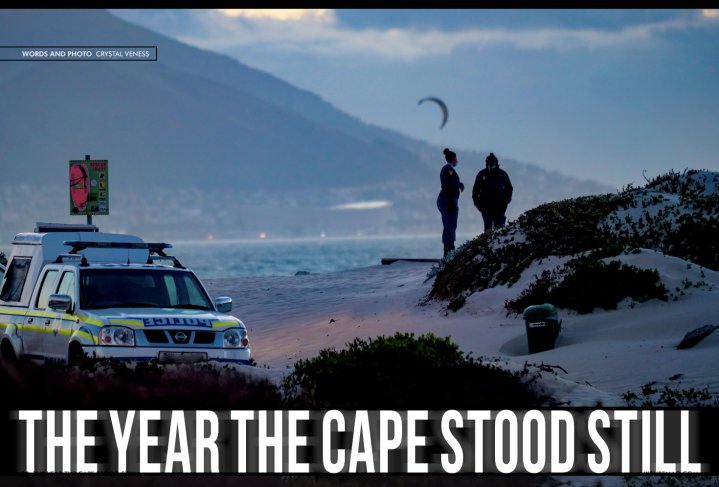
The Year The Cape Stood Still
Issue 85 / Thu 4th Feb, 2021
What happened in South Africa this year? Instead of analysing the King of the Air results, we’re taking a closer look at police interactions with kiters. Rather than a busy big air season in Blouberg, the locals are looking for outlets for civil disobedience. Get the inside scoop on the past year in Cape Town in this feature article!
The sun has just set in Cape Town, South Africa. In the windy beachfront community of Blouberg, the street is eerily quiet as night creeps in. There is only the noise of the howling wind, suddenly interrupted by the steady thumping of a military helicopter passing over the beach, not more than 10 metres off the ground. Everyone in the beach vicinity stops to watch the display.
Suddenly, the street erupts into a flurry of activity. It’s 8:50 pm and the impending curfew has whipped everyone into a state of panic. With only 10 minutes to get back to the relative safety of home, vehicles take to the street for the nightly migration. Those with more distance to travel race at top speed down the beach road, while others, like ourselves, cruise the short distance home, arriving just as the clock strikes 9:00 pm.
Driving by the empty shell of Pakalolos, it’s hard not to think about where we were last year when COVID-19 was but a whisper in the wind. Almost exactly one year ago, thousands of raucous kitesurfers marched up the beach with Jesse Richman on their shoulders. The 2020 King of the Air had just wrapped up, and Jesse had looped, swooped, and dangled his way through the finals, catapulting himself to the top of the podium. Pakalolos was heaving with happy kiters from all over the world, eager to watch the sunset with a cold Castle Lite in hand.
That moment, in this place, was when the heartbeat of the entire kite community beat the loudest. Today, that beating heart is smothered.
It has been a year of uncertainty around the world. In South Africa, local kiters and business owners slogged through winter, waiting for the light at the end of the tunnel in the form of a summer full of wind, the return of foreign friends, and a marked uptick in business. At IKSURFMAG, we hoped that we would have stopped featuring articles about the pandemic in 2021. Surely, we thought, we would have moved on to something else by now? Perhaps we have all been naive in our hopes.
The 2020 kite season stumbled to a close in March, with most kiters fleeing home before South Africa’s borders slammed shut. We hung on to the words of President Cyril Ramaphosa as he announced an imminent lockdown in an attempt to halt the spread of the new Coronavirus before it took hold in this vulnerable nation. For 21 days, we were to stay at home, except for food and medicine. There was no sale of alcohol or cigarettes. Masks were mandatory outside of the home. Even going for a jog or walking the dog was illegal! With only 402 confirmed cases of the virus, it seemed like an extreme measure. Yet, with so much still unknown, for better or for worse, we strapped in for the ride, armed with a small stockpile of pasta, rice, toilet paper (hah!), and whatever wine or beer we had the forethought to purchase before the lockdown.
It was May 1st when the slow relaxation of lockdown restrictions began. For the first time, citizens were allowed to leave their homes between 6:00-9:00 am to exercise. Surfers, desperate for a morning session, raced to the beaches to feel that salty sea for the first time in 5 weeks, only to be turned away by police and military. They silently expressed their frustration in socially distant protests, asking the government to let them back onto the water so they could exercise in socially distant peace.
As lockdown restrictions eased further on June 1st, surfers and kiters made their way once again to the beach, relieved. Yet again, they were blocked from the water. Some surfers were arrested by authorities, while others stood their ground and paddled out. The tensions between kiters, surfers, and the police continued to simmer until late June when things just sort of… dissipated. Unofficially, surfing was back on the map!
Once movement between provinces was allowed, South Africans set off on road trips, exploring close to home. Airush rider Oswald Smith spent a rare winter season at home, “Being stuck here gave me a lot of time to free roam and explore some spots I would never go to. I felt like a tourist in my own country and I loved it!”
F-ONE team rider Matt Maxwell had been doing university courses at home and got to experience winter at his local beach. "No matter the conditions, people from all over the country were flocking to the beaches. With so many industries struggling due to the pandemic, it was crazy to see and hear how watersports equipment sales, particularly surfboards and wetsuits, were going through the roof both in SA, but also around the world, as more and more people had time on their hands for hobbies. As you can imagine, the lineup was pretty full!"
Outside of the kite world, most of the country was experiencing a financial drought. There were several restrictions still in place and business owners, especially those in the restaurant and tourism industry, were at a loss, literally and figuratively.
There was a glimmer of hope when borders reopened again, first with a whisper, and then with a bang. On October 1st, the country welcomed visitors from a shortlist of countries, before giving up and allowing anyone with a negative COVID-19 test in from November 12th. South Africans abroad finally returned home, and visitors trickled back in as summer returned to the Western Cape. Everything was open and it seemed about as close to normal as possible, apart from everyone wearing masks in public and some restrictions on events.
The season started strong, with plenty of wind and waves to go around for the few kiters that were in the country. The downwind crews were made of mostly locals, and the energy was starting to build along with the wind as kite season kicked off in full force.
As 2020 drew to a hopeful close, we had all settled into an only slightly altered summer routine. Surf in the morning, work from home, and head out for a kite when the wind picked up! However, the minimal restrictions led to increasingly risky behaviour across the country and South Africa plummeted into a second wave. Cases were rising at a catastrophic pace, driven by the new, more contagious 501.V2 variant.
The timing was poor as Red Bull had just announced the riders list for King of the Air 2021, and big air fans were hopeful for the event of the year, and some return to normalcy in the kitesurfing event calendar. Even if most would be watching from afar, it was sure to be an event to remember with so many new riders qualifying for the 2021 competition. When news of the event postponement arrived on January 2nd, it was expected but still severely disappointing.
We spoke with Sergio Cantagalli, Sportive Director for KOTA, who said that timing had been on their side for the 2020 event. They had been able to run and complete the project safely. For 2021, things were less certain. "We had to start working on a day to day basis, knowing that any project could have been cancelled the next day."
Cantagalli gave us some more insight on the decision, saying, "After video contest results and selection and obtaining all permits to stage the event, we were more and more confident that things would have been our side for the 2021 edition. In December, it all collapsed, together with our hope and positiveness due to a second wave hitting the country and new regulations and limitations, including the full closure of beaches with high uncertainty on when they would be reopened. This has sadly left us with no choice but to postpone the event to November/December, the next South Easterly wind season."
Competitor Steven Akkersdijk was supportive of the decision, saying, "It’s a shame they postponed KOTA, but with the entire world experiencing another wave of COVID-19, I think it’s the right thing to do. Athletes travelling the world to enter a dangerous competition doesn’t look so good during these times."
The new restrictions that triggered this decision were announced on December 28th, when the entire country moved into an adjusted level 3 lockdown, with nearly every beach in South Africa closed. Alcohol was off the map yet again, indoor and outdoor gatherings were banned, curfew was set from 9:00 pm to 5:00 am, and land borders were closed. International air travel, however, was still allowed. Without having to cancel tourism, the new restrictions had effectively cancelled it, anyway.
Kiters within the country were disappointed to miss out on a New Year’s Day session, especially with a solid wind forecast and no hope for a hangover due to the curfew and gathering restrictions. Yet, it made sense. To slow down the spread of COVID-19 during the holidays and prevent the public from descending upon the beaches and engaging in risky, hard to enforce behaviour, a holiday lockdown seemed fair.
After January 4th, this understanding from the kite community began to fade quickly as the wind continued to pump every day. Perusing the written lockdown rules, kiters found ways to access the water without using the beach. The beaches were closed, but the water was not, right? Kite schools took riders out on boats, and some kiters even attempted to kite from slipways, where other watercraft were allowed to launch.
On January 5th, a German kitesurfer took on the role of lead villain in the police ‘War Against Kitesurfers’. His evening session in Langebaan was interrupted by a police boat containing six officers armed with machine guns. They shouted at him to return to the beach, where Park Rangers were waiting to inform him that he would be placed under arrest. If that wasn’t enough of a show of force, a convoy of luxury SUVs arrived at the beach, containing the Police Minister, General Bheki Cele, and his closest aides.
With news cameras recording and more than 30 officers on the beach, the German kitesurfer and another from Russia were taken into custody. They were released after signing an admission of guilt and paying a fine and have yet to find out if this will be considered a criminal offence that could prevent them from visiting South Africa in the future.
The police blitz on kitesurfing moved down the coastline to Bloubergstrand, where police had been chasing a mystery rider on a green North Orbit up and down the beach for hours without success. Local rider Andrew Tompkins had been out for an evening session, and unaware of the drama unfolding upwind, found himself bearing the brunt of the police frustration when he landed his kite on the beach after dark.
Andrew wrote to say, “I saw the police van pull up to where I was kiting, so I did a big tack out to sea into the darkness hoping they'd just drive off... I went about 400m upwind and saw the police still waiting for me downwind. I landed my kite in the dark and was taking the lines off when I saw a few guys running down the beach towards me. I thought I'd better get off of the beach so I left my board and bar and ran off with my kite. The police chased me and I stopped running when they pulled out their guns. Initially, they were quite aggressive. They had mistaken me for the other kiter they'd been chasing all afternoon. They left me at the police station to go on another call-out, and when they got back, they'd chilled out a bit. They drove me home with me sitting in the front with them having a nice chat. They wanted to learn how to kite!”
The confrontations between police, kiters, and surfers have continued, with police going so far as to deploy a helicopter to confront a few defiant kitesurfers and even throwing stun grenades at surfers in Cape St Francis.
While it is reasonable to argue that the beaches are closed, and kitesurfers should respect these instructions from above, it is also worth considering the plight of the kitesurfer. In South Africa, runners, cyclists, walkers, hikers, and golfers are allowed to enjoy their sport or form of exercise as long as they do not do so on the beach. What makes kitesurfing and surfing different? Are kiters entitled assholes for thinking that they are being treated unfairly, or is something amiss here?
In countries where all non-essential shops and businesses are closed, the restriction on movement of people outdoors is expected, and reasonable. Here in South Africa, the President has asked that the public avoid closed spaces, crowded places, and close contact with others. Yet, casinos, cinemas, gyms, malls, and restaurants are open. Gyms are open, but crossing the beach to participate in watersports is banned. The disconnect between public health advice and policy is staggering.
Matt Maxwell says, "I fully understand the impact and reasoning behind a lockdown, however, it confuses me that gyms, malls and other confined public spaces are still open, yet beaches - possibly the most unconfined, COVID-safe areas of all - remain closed."
Oswald Smith is at the end of his rope, "I'm gonna put it plain, simple, and bluntly. It's BS. The beach is another means for us avid water enthusiasts to express ourselves, blow off steam, and remind ourselves that life ain't too bad. Closing the beaches feels like I'm being deprived of my livelihood. I do get the fact that people congregate there, but if they would just amend the lockdown to straight in the water and straight out, it wouldn't hurt a fly."
A police officer who asked not to be named said that there are more important crimes happening in other areas, but they have been instructed by their supervisors to enforce the beach ban and stop surfers and kitesurfers. He does not agree with the beach ban and doesn’t think kitesurfers are spreading COVID-19 out on the water, but he has to do his job. He hopes that it will change soon. We all hope it will change soon.
What does the average day in South Africa look like today as the beach ban continues? Things haven’t come to a complete standstill... far from it! Kiters walk or drive up and down the road adjacent to the beach, camouflaged amongst the throngs of active individuals using the boardwalk. They slip furtive messages to each other on Facebook and WhatsApp groups, updating their comrades on the police presence.
News of law enforcement confrontations in the kite community spread even faster than the latest mutation of COVID-19, yet defiant down winders continue to be planned, and getaway drivers are called on for support. After a long day of wind and an empty ocean, time emboldens the subversives.
Once the first kiter makes it to the water, a veritable floodgate opens. The mutiny has begun! Small packs of rebels sneak in groups down to the beach or launch from yards or parking lots, racing to get to the water before the police arrive. After careful perusal of lockdown measures by wind-loving lawyers, It is generally understood that the only illegal thing is refusing to obey an order from law enforcement. Kiters on the water steer clear of any bogeys on the beach, hoping to avoid getting flagged down and threatened with fines, arrest, or confiscation of gear.
While any other year would see hundreds, if not a thousand kiters on the water every day, this year that number rarely breaks 100. The dissenters sail through the air while throwing a big middle finger up to what they believe is an illogical rule. We are inclined to agree. At a time when the safest place to be is outside, we firmly believe that kitesurfing is not a crime.
At the time of publication, there have been exciting new developments in South Africa. As of the evening of February 1, 2021, beaches and outdoor spaces have been reopened to the public, subject to rules on gathering and social distancing. Who knows if it will be enough to salvage the season for the local industry and small business in the area? Will the relaxation of some restrictions cause another surge in infections?
This next phase of the COVID saga in South Africa is just beginning. We are cautiously hopeful that this is the beginning of something better for everyone. There’s a lot that remains uncertain, but one thing we know for sure is: The forecast looks pretty good this weekend and I can finally go kiting! Legally!
Videos
By Crystal Veness
Editor at IKSURFMAG, Crystal Veness hails from Canada but is based in South Africa. When she isn't busy kitesurfing or reporting on the latest industry news for the mag, she is kicking back somewhere at a windy kite beach or working on creative media projects.


